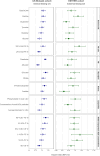Exploring metabolomics for colorectal cancer risk prediction: evidence from the UK Biobank and ESTHER cohorts
- PMID: 40361100
- PMCID: PMC12077020
- DOI: 10.1186/s12916-025-04107-w
Exploring metabolomics for colorectal cancer risk prediction: evidence from the UK Biobank and ESTHER cohorts
Abstract
Background: While metabolic pathway alterations are linked to colorectal cancer (CRC), the predictive value of pre-diagnostic metabolomic profiling in CRC risk assessment remains to be clarified. This study evaluated the predictive performance of a metabolomics risk panel (MRP) both independently and in combination with established risk factors.
Methods: We derived, internally validated (IV), and externally validated (EV) a metabolomics risk panel (MRP) for CRC from data of the UK Biobank (UKB) and the German ESTHER cohort. Baseline blood samples were assessed for 249 metabolites using nuclear magnetic resonance spectroscopy analysis. We applied LASSO Cox proportional hazards regression to identify metabolites for inclusion in the MRP and evaluated the model performance using the concordance index (C-index). We compared the performance of the MRP to an environmental risk panel (ERP; sex, age, body mass index, smoking status, and alcohol consumption) and a genetic risk panel (GRP; polygenic risk score).
Results: The study included 154,892 participants of the UKB cohort (mean age at baseline 54.5 years; 55.5% female) with 1879 incident CRC and 3242 participants of the ESTHER cohort (mean age 61.5 years; 52.2% female) with 103 CRC cases. Twenty-three metabolites, primarily amino acid and lipid-related metabolites, were selected for the MRP, showing moderate predictive performance (C-index 0.60 [IV] and 0.54 [EV]). The ERP and GRP showed superior performance, with C-index values of 0.73 (IV) and 0.69 (EV). Adding the MRP to these risk models did not change the C-indices in both cohorts.
Conclusions: Genetic and environmental risk information provided strong predictive accuracy for CRC risk, with no improvements from adding metabolomics data. These findings suggest that metabolomics data may have limited impact on enhancing established CRC risk models in clinical practice.
Keywords: Biomarkers; Colorectal cancer; Metabolomics; Risk stratification.
© 2025. The Author(s).
Conflict of interest statement
Declarations. Ethics approval and consent to participate: UK Biobank: Ethics approval for data collection was obtained by the data source UK Biobank. All participants provided written informed consent, and ethical approval was obtained from the North West Multicentre Research Ethics Committee (MREC). This research has been conducted in the framework of the UK Biobank application no. 101633 “Use of omics data to understand better the etiology of age-related diseases and to improve their risk prediction.” ESTHER: The ESTHER study has been approved by the ethics committees of the Medical Faculty of Heidelberg University (reference number: S-58/200) and of the state medical board of Saarland, Germany. Written informed consent was obtained from all participants. The study is being conducted in accordance with the Declaration of Helsinki. Consent for publication: Not applicable. Competing interests: The authors declare no competing interests.
Figures



References
-
- Bray F, Laversanne M, Sung H, Ferlay J, Siegel RL, Soerjomataram I, et al. Global cancer statistics 2022: GLOBOCAN estimates of incidence and mortality worldwide for 36 cancers in 185 countries. CA Cancer J Clin. 2024;74(3):229–63. 10.3322/caac.21834. - PubMed
-
- Dekker E, Tanis PJ, Vleugels JLA, Kasi PM, Wallace MB. Colorectal cancer. Lancet. 2019;394(10207):1467–80. 10.1016/S0140-6736(19)32319-0. - PubMed
-
- Mina PR. Metabolomics approach to identify biomarkers of epidemic diseases. In: Soni V, Hartman TE, editors. Metabolomics. Cham: Springer International Publishing; 2023. p. 93–126.
MeSH terms
LinkOut - more resources
Full Text Sources
Medical

